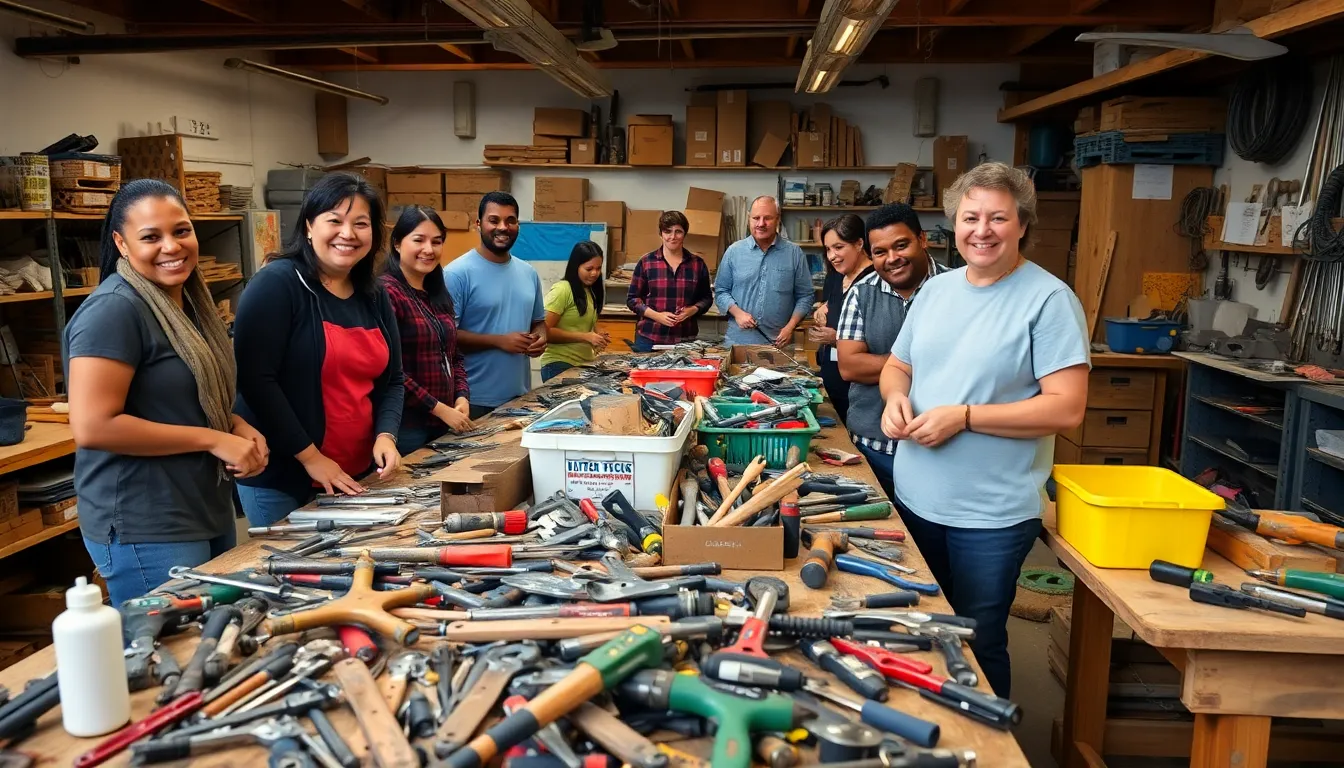In a world where tools often gather dust in dark corners of garages, the idea of tool donation shines brighter than a freshly polished wrench. Imagine transforming that old saw into a lifeline for someone in need. Tool donation is not just a noble act; it’s a chance to declutter your space while making a real difference.
Table of Contents
ToggleWhat Is Tool Donation?
Tool donation refers to the act of giving away unused or excess tools to individuals or organizations that can benefit from them. Donors often include homeowners, contractors, and hobbyists who no longer require specific tools. By donating tools, individuals contribute to community projects, schools, or trade training programs, enhancing the skills of others.
Organizations interested in receiving tools commonly focus on vocational training and DIY initiatives. Programs may provide apprenticeships, hands-on learning experiences, or encourage sustainable practices in local communities. Donated tools become valuable assets, enabling these organizations to equip students and participants with the necessary resources for success.
Tools such as hammers, drills, and saws are prevalent in donation drives. Local non-profits, charities, and community centers often host events to collect items. Those interested in donating can check local listings or websites for upcoming collections, ensuring donated tools reach the right hands.
Positive environmental impacts stem from tool donation. Reducing waste contributes to a circular economy where items have renewed purposes. Every tool donated decreases landfill contributions while increasing the potential for reuse and repurposing.
Reputable organizations usually provide receipts for tax purposes, allowing donors to receive deductions on their returns. Valuating donated tools might require assessing their brand, condition, and functionality. Donors contribute to a sense of community by choosing to donate instead of discard, finding purpose in items they no longer use.
Benefits of Tool Donation

Tool donation provides numerous advantages, particularly in enhancing community welfare and promoting sustainability. It encourages the repurposing of tools, contributing to various positive outcomes.
Supporting Local Communities
Tool donation strengthens local communities by supplying vital resources. Many community centers and organizations rely on donated tools for programs that teach valuable skills. Vocational training initiatives flourish when students have access to various tools for practice. Sharing tools helps hobbyists and contractors complete projects, benefiting both individuals and the community as a whole. Donated tools empower those who might lack the resources to engage in home repairs, DIY activities, or vocational training programs. As a result, enhanced skills and knowledge lead to improved employment opportunities.
Environmental Impact
Tool donation significantly reduces waste, aligning with sustainability goals. Reusing tools minimizes the environmental impact typically associated with manufacturing new items. By donating instead of discarding, individuals contribute to a circular economy that values every resource. Each donated tool represents a step toward responsible consumption, preventing landfill overcrowding. Emphasizing sustainability, organizations that accept donations often educate their communities about the importance of reusing materials. This approach not only preserves natural resources but also fosters environmentally conscious behaviors.
How to Donate Tools
Donating tools involves careful consideration and effort. Following specific steps can make the process efficient and impactful.
Choosing the Right Tools
Consider donating tools that are in good condition. Examples include hammers, drills, and saws. Donors should think about items they no longer use or need. Usable tools contribute significantly to community projects and vocational training. Prioritize quality items to ensure they benefit others. Items that show signs of wear but are still functional are also acceptable. Donors can assess the value based on brand reputation and performance. Selecting tools that align with community needs enhances their impact.
Finding Donation Centers
Identify local organizations that accept tool donations. Many non-profits, community centers, and schools welcome tool donations for various programs. Researching online can help find nearby donation centers. Some organizations hold collection events regularly, making it easy for donors. Verify the organization’s mission to ensure it aligns with the purpose of your donation. Local trade schools often benefit from donated tools, providing hands-on learning experiences. Connecting with these centers maximizes the benefits of your donation while supporting community initiatives.
Organizations Involved in Tool Donation
Numerous organizations facilitate tool donations, directly supporting individuals and communities. Non-profits play a significant role, often accepting tools for vocational training programs. Community centers regularly host collection events, making it easier for donors to contribute.
Trade schools also benefit from tool donations, using them for hands-on learning experiences. Local construction organizations often seek tools to aid in community-building projects. Habitat for Humanity receives various tools, using them in home construction and repair efforts.
Rebuilding Together focuses on helping low-income families with home repairs and relies heavily on donated tools. Additionally, charities like Goodwill accept tools, integrating them into their job training programs.
Universities and colleges may also establish tool banks, providing students access to equipment for projects. Some municipalities create tool libraries, allowing community members to borrow tools as needed.
National programs, such as Tools for Schools, collect donations for educational institutions, enhancing learning opportunities in trades. Many organizations prioritize environmental sustainability, encouraging reuse and minimizing waste.
Support from these organizations strengthens communities by ensuring individuals have access to necessary tools for DIY projects and home improvement. Engaging in tool donation not only provides resources but also promotes vocational skill development for those in need.
Tool donation serves as a powerful way to enhance community welfare while promoting sustainability. By giving away unused tools, individuals not only declutter their spaces but also provide vital resources for vocational training and DIY projects. This act of generosity strengthens local communities and empowers those who may lack access to essential tools.
Moreover, the environmental benefits of tool donation cannot be overlooked. It encourages responsible consumption and helps reduce waste, aligning with broader sustainability goals. Donors play a crucial role in fostering a culture of reuse, ensuring that tools find new life and purpose.
Ultimately, engaging in tool donation is a simple yet impactful way to make a difference. By connecting with local organizations, individuals can contribute to meaningful initiatives that uplift communities and support skill development for a brighter future.


